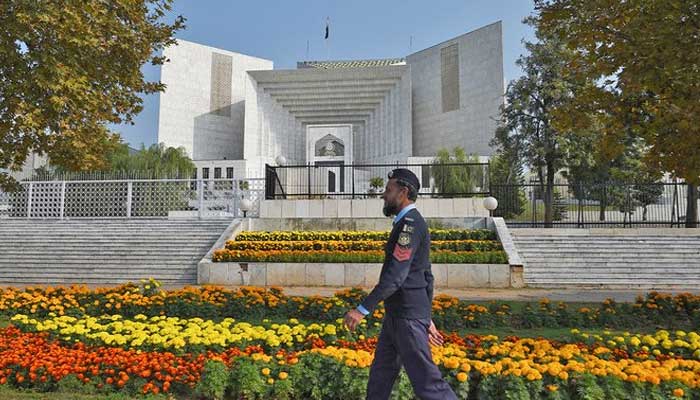PML-N, AGP seek formation of full court in SC bill case
SC directs AGP to submit record of NA proceedings on SC bill by tomorrow and adjourns hearing for three weeks
The Pakistan Muslim League Nawaz (PML-N) and Attorney General for Pakistan Usman Mansoor Awan on Monday requested the Supreme Court (SC) to constitute a full bench to hear the set of pleas challenging law curtailing the chief justice’s powers to initiate suo motu proceedings or form benches.
An eight-judge bench takes up the pleas that heard them earlier. It comprises Chief Justice of Pakistan (CJP) Umar Ata Bandial, Justice Ijazul Ahsan, Justice Munib Akhtar, Justice Sayyad Mazahar Ali Akbar Naqvi, Justice Muhammad Ali Mazhar, Justice Ayesha Malik, Justice Syed Hasan Azhar Rizvi and Justice Shahid Waheed, had resumed the hearing on the pleas filed against a bill clipping the top judge's powers.
In the last hearing, CJP Bandial had turned down the attorney general's plea to withdraw the stay order restricting the implementation of the Supreme Court (Practice and Procedure) Bill 2023, which the top court had passed on April 13.
“Our stay order of the last hearing is in place. Law related to the Supreme Court rules are very clear,” the chief justice had said.
Today's hearing
At the outset of the hearing, Attorney General of Pakistan (AGP) Mansoor Usman Awan requested the bench to constitute a full court to hear the pleas. Meanwhile, Pakistan Muslim League-N's (PML-N) lawyer Salahuddin Ahmed also informed the court that they have also filed a similar plea seeking the formation of a full court.
During the hearing, the bench questioned the motives behind the government's demand of a full court.
The top judge remarked that the court had to decide for future, the circumstances in which the bench can order the constitution of a full court.
"The current issue was not a case of constitutional amendment," CJP Bandial observed.
He directed the parties to present examples of cases other than presidential references on Justice Faez Isa and Justice Iftikhar Chaudhry, if any.
The case cannot be concluded today as it requires further assistance and arguments from other parties, the top judge remarked while adjourning the hearing for three weeks. He said that some members of the bench were going out of city therefore the hearing was being adjourned for this long.
The bench also directed the lawyers to tell if they had confidence in the current bench or not, and if this was the case then this matter should be sorted first before.
Earlier, when the AGP started his arguments, CJP Bandial inquired if he had submitted the record of the National Assembly’s proceedings.
Regarding the query, the AGP said that they expected the records to be received by tomorrow (Tuesday). He informed the court that they had contacted the National Assembly Speaker’s office in this regard.
AGP Awan argued that the court had declared that the basic structure of the Constitution was present. The judicial reform law involves the matter of the formation of benches and appeals, he said.
The bill also gives the right to change the lawyer, he added.
He further stated that the matters decided in the bill were of administrative nature and the Supreme Court (Practice and Procedures) Act, 2023, could be amended by a full court.
He said that cases related to the independence of the judiciary and rules should also be heard by a full court.
Moreover, the law will also apply directly to judges who are not hearing the case.
At this, Justice Ahsan remarked that the question was not about the amendments, but whether there were such legislative powers or not.
Meanwhile, Justice Naqvi inquired if there had been any legislation like the bill in question in the past.
At this, the AGP maintained that the president's permission was required to make the rules until 1973.
Responding to this, Justice Naqvi objected that how can such a legislation be done in the presence of Article 191 of the Constitution.
Meanwhile, Justice Mazhar remarked that the government's plea had stated that this case was the "first case of its kind".
Chronology of events
On March 28, parliament passed the bill, aimed at curtailing the unbridled powers of the chief justice. The bill restricts the chief justice’s powers to take suo motu notices as well as to constitute benches on his own.
Instead, it stipulates that these powers will be vested in a three-member committee, comprising the chief justice and two-senior most judges.
However, President Arif Alvi returned the bill back to parliament on April 8, without giving his assent. Subsequently, the lawmakers passed the bill again on April 10 in a joint session and resent it to the president.
As per the country’s law, the president has 10 days to give his assent to a bill passed by a joint sitting of the Senate and National Assembly. However, even if the president does not give his assent, the bill automatically becomes a law and takes effect after that period, which in this case was April 20.
To prevent the bill from taking effect, three petitions were filed in the top court which will be heard for the third time today.
-
Security forces gun down 30 terrorists in multiple IBOs in KP: ISPR
-
MQM-P calls for new province in Sindh
-
US report validates Pakistan military edge over India: PM
-
Banned TTP poses serious threat to Pakistan security: UNSC panel
-
CM Afridi clarifies remarks on by-poll after ECP requests army deployment
-
Dubai sees 3.2m Pakistani passengers in 2025 as airport sets new milestone
-
Security forces kill 23 Indian proxy terrorists in KP's Kurram
-
Pakistan to construct island to boost oil exploration: report












